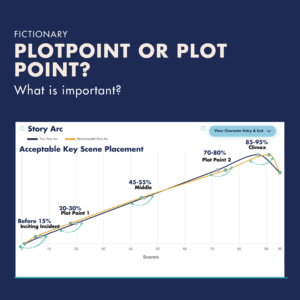
First, let’s talk about spelling of plotpoint. One word or two. It doesn’t matter. What does matter is that you know what a plotpoint is and how to use it in your story.
My point. It won’t matter how perfect your spelling and grammar are if you don’t have a powerful story. Knowing what each plotpoint is will help you evaluate if you have a powerful story.
Why is the Story Arc Important?
Also known as a narrative arc, the story arc has been around for centuries. Want proof? Check out The Story Arc: A Look Back in History.
The story arc is a proven form for stories. The human brain is somehow attracted to the form and it’s the way we love to experience stories. It doesn’t matter if the story is an epic poem, a novel, or a movie. The form is the same.
And this form contains plotpoints.
Plotpoints of the Story Arc
Plotpoints are events in the story that have meaningful impact on the protagonist.
To start, in the inciting incident an event happens that shakes up the protagonists world.
In plotpoint one an event occurs that the protagonist can’t turn back from. This could be something that happens to the protagonist, it could be a decision the protagonist makes, or it could be something the protagonist causes.
At the midpoint, the protagonist changes from reactive mode to proactive. This is where they take action to achieve their goal.
During plotpoint two, the protagonist is at the lowest point in the book. An event happens and the protagonist thinks they are lost, there is no way they can achieve this goal.
And then on the climax. This is the big event where the protagonist either wins or loses.
What do Plotpoints Have in Common?
- The protagonist is in all the plotpoint scenes. This is a must or the character arc will fail.
- Each plotpoint scene is written in active form. There is no narrative summary here. The reader wants to experience the scene along with the protagonist.
- The key event in the plotpoint scene relates to the plot and to the protagonists main goal for the story.
Master this form, and you’re on your way to being a master storyteller.
For some fun, this is my favorite video on why stories captivate.

StoryTeller is creative editing software for fiction writers. Transform your story, not just your words. Successful stories depend on your ability to self-edit a novel, improve, and revise your work. Only when you master story editing, can you master storytelling.
StoryTeller draws a recommended story arc and draws the story arc for your story. You can see how to improve the structure of your story within seconds.
Why not check out Fictionary’s StoryTeller free 7-day trial and tell powerful stories?

